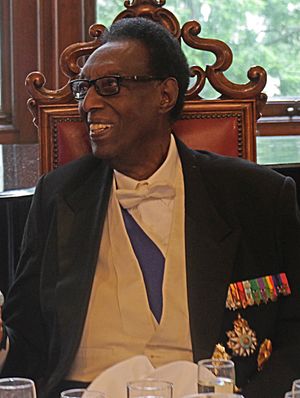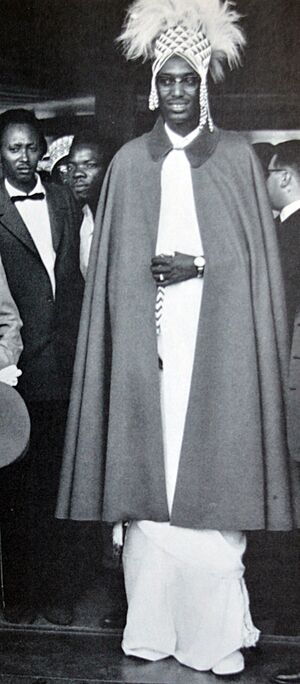Kigeli V Ndahindurwa facts for kids
Quick facts for kids Kigeli V Ndahindurwa |
|
|---|---|

Kigeli V shortly before his death, at the National Liberal Club in London
|
|
| Mwami of Rwanda | |
| Reign | 28 July 1959 – 1 July 1962 |
| Predecessor | Mutara III of Rwanda |
| Successor | Yuhi VI of Rwanda (in pretense) |
| Born | 29 June 1936 Kamembe, Ruanda-Urundi |
| Died | 16 October 2016 (aged 80) Washington D.C., U.S. |
| Burial | 15 January 2017 Nyanza District, Rwanda |
| Clan | Abanyiginya |
| Father | Yuhi V of Rwanda |
| Mother | Mukashema Bernadette |
| Religion | Roman Catholicism |
Kigeli V Ndahindurwa was the last King of Rwanda, a country in Africa. His birth name was Jean-Baptiste Ndahindurwa. He was born on June 29, 1936, and passed away on October 16, 2016.
Kigeli V became King (or Mwami) on July 28, 1959. He ruled until July 1, 1962, when Rwanda became an independent republic. Before this, a vote was held on September 25, 1961. In this vote, people decided to end the monarchy (rule by a king or queen) after a big change called the Rwandan revolution.
After leaving Rwanda, Kigeli V lived in Oakton, Virginia, United States. Even in exile, he worked to help others. He led the King Kigeli V Foundation, which helped Rwandan refugees. He also worked to keep the history and traditions of his royal family alive. After his death, his nephew, Yuhi VI of Rwanda, was named as his successor.
Contents
Early Life and Education
Kigeli was born Ndahindurwa on June 29, 1936, in Kamembe, Rwanda. His father was Yuhi Musinga, who was the King of Rwanda before him. His mother was Queen Mukashema Bernadette. Kigeli was part of the Tutsi ethnic group. He was one of his father's many children.
When Kigeli was four years old, his father was sent away by the Belgian government to Moba in the Democratic Republic of the Congo. Kigeli returned to Rwanda in 1944 after his father passed away. As a teenager, he became a Catholic and was very religious throughout his life.
He went to school at Groupe Scolaire Astrida in Rwanda. He also studied at Nyangezi College in the Democratic Republic of the Congo. After finishing school in 1956, he worked for the local government in Rwanda until 1959.
Becoming King of Rwanda
Kigeli's half-brother, King Mutara III Rudahigwa, died unexpectedly on July 25, 1959. Just three days later, on July 28, it was announced that Kigeli would become the new King, Kigeli V Ndahindurwa. His half-brother had no children, and his death was a surprise to many.
The Belgian government was surprised by Kigeli's sudden rise to power. They called it a coup d'état, which means a sudden takeover of power. Kigeli himself was also shocked to become king. At first, many groups in Rwanda, including Tutsi traditionalists, Hutu nationalists, and Catholic leaders, were hopeful about his rule. However, the way he became king caused some problems. It made the Belgian authorities seem less powerful. It also made some revolutionaries think that using violence could help them reach their goals.
King Kigeli V tried to be a fair leader for all Rwandan people. But political problems and conflicts between different groups grew worse. Just one month after he became king, fighting between Hutu and Tutsi groups increased, and many people died. Many Tutsi people had to leave the country. The Belgian military also encouraged problems with the Hutu population, leading to widespread revolt. Kigeli later said he would accept what the people wanted, but not if the Belgian government tried to control the outcome.
In July 1960, Kigeli went to the newly independent nation of Congo for safety. In 1961, while Kigeli was in Kinshasa meeting with the United Nations Secretary General Dag Hammarskjöld, a new leader named Dominique Mbonyumutwa took control of Rwanda. This was supported by the Belgian government. The king's rule was officially ended on January 28, 1961. This led to a special vote in 1961 about whether Rwanda should still have a king.
About 95% of people voted in the election. Around 80% of them voted against having a monarchy. Kigeli said the election was unfair. Soon after he returned to Rwanda before the election, Belgian officials put him under house arrest.
The government officially sent Kigeli away to what is now Tanzania on October 2, 1961. He then lived in other places like Kampala, Uganda, and Nairobi, Kenya. In July 1992, he was given political asylum in the United States. He lived there for the rest of his life.
Life in Exile
After being granted political asylum in the United States, Kigeli settled near Washington, D.C.. He later lived in Oakton, Virginia.
He traveled around the world to speak for the Rwandan people. He often asked for peace and understanding between different groups. Kigeli always remembered the victims of the Rwandan genocide. He tried to help all political, ethnic, and religious groups in Rwanda work together to solve their problems peacefully. Kigeli was also friends with former President of South Africa Nelson Mandela.
In an interview with BBC in August 2007, Kigeli said he wanted to return to Rwanda. But he said he would only go back if the Rwandan people wanted him to be their constitutional monarch. This means a king who follows a country's laws and constitution, not one with absolute power. He mentioned meeting President Paul Kagame, who told him his family could return. But Kigeli wanted to know if the people still wanted him as king.
Charity Work
Kigeli was the leader of the King Kigeli V Foundation. This organization worked to help Rwandan refugees with humanitarian aid.
Death and Successor
Kigeli passed away from a heart problem on October 16, 2016, at the age of eighty. He died in a hospital in Washington, D.C.. His private secretary said that a new successor would be announced soon. Kigeli never married. This was because of a rule that kings should not marry while they were out of the country.
Even though Kigeli never married, on January 9, 2017, the Royal House announced his nephew, Prince Emmanuel Bushayija, would succeed him. He would be known as Yuhi VI of Rwanda. Prince Emmanuel is the son of Kigeli's half-brother, Prince William Bushayija.
After Kigeli's death, it was also shared that he had at least one daughter, Jacqueline Rwivanga. She was married to Andrew Rugasira and has five children.
Honors and Recognition
As a king in exile, Kigeli V continued to keep his royal family's traditions alive. He gave out special chivalric orders and noble titles. This was part of the customs of his royal house.
Research in 2016 showed that previous Rwandan kings, like King Mutara III, also gave noble titles to people who were not Rwandan. This was confirmed in an article from 1947 called "African King Gets Papal Honor from Vatican."
Some organizations, like Burke's Peerage and the Augustan Society, recognize these titles.
Royal Orders of Rwanda
Kigeli V was the Grand Master of several royal orders:
 The Royal Order of the Drum
The Royal Order of the Drum The Royal Order of the Crown (Rwanda)
The Royal Order of the Crown (Rwanda) The Royal Order of the Crested Crane (Rwanda)
The Royal Order of the Crested Crane (Rwanda) The Royal Order of the Lion (Intare) (first given by King Mutara III Rudahigwa)
The Royal Order of the Lion (Intare) (first given by King Mutara III Rudahigwa)
Awards from Other Countries
Kigeli V also received honors from other royal families and countries:
 Knight Grand Cross of the Order of Saints Maurice and Lazarus (House of Savoy)
Knight Grand Cross of the Order of Saints Maurice and Lazarus (House of Savoy) Knight Grand Cross of the Order of the Immaculate Conception of Vila Viçosa (House of Braganza)
Knight Grand Cross of the Order of the Immaculate Conception of Vila Viçosa (House of Braganza) Knight Grand Cross of the Order of Saint Michael of the Wing (House of Braganza)
Knight Grand Cross of the Order of Saint Michael of the Wing (House of Braganza) Knight Grand Cross of the Order of the Queen of Sheba (Solomonic dynasty)
Knight Grand Cross of the Order of the Queen of Sheba (Solomonic dynasty) Knight Grand Cross of the Order of the Star of Ethiopia (Ethiopian Empire)
Knight Grand Cross of the Order of the Star of Ethiopia (Ethiopian Empire) Knight of the Imperial Order of Solomon (Ethiopian Empire)
Knight of the Imperial Order of Solomon (Ethiopian Empire) Knight Grand Collar of the Royal Order of Ismail (Royal House of Egypt)
Knight Grand Collar of the Royal Order of Ismail (Royal House of Egypt) Knight Grand Collar of the Order of the Eagle of Georgia (Royal House of Georgia)
Knight Grand Collar of the Order of the Eagle of Georgia (Royal House of Georgia) Knight Grand Collar of the Order of Merit of the Portuguese Royal House (House of Braganza)
Knight Grand Collar of the Order of Merit of the Portuguese Royal House (House of Braganza) Knight Grand Cordon of the Royal and Hashemite Order of the Pearl
Knight Grand Cordon of the Royal and Hashemite Order of the Pearl
Other Awards
- He received the Gold Star Award from the International Strategic Studies Association. This was for his great work helping Rwandan refugees in Africa.
See also
 In Spanish: Kigeli V para niños
In Spanish: Kigeli V para niños



